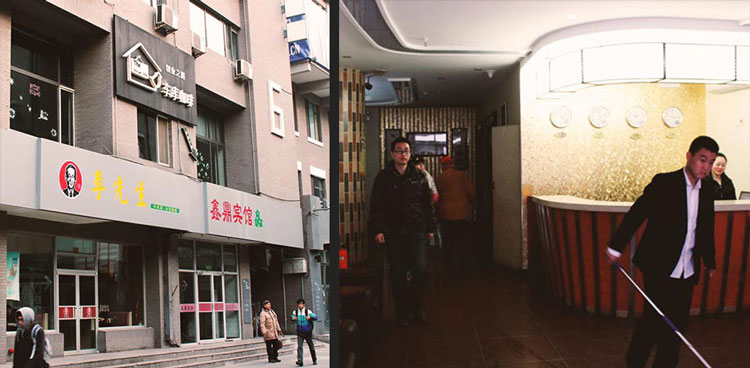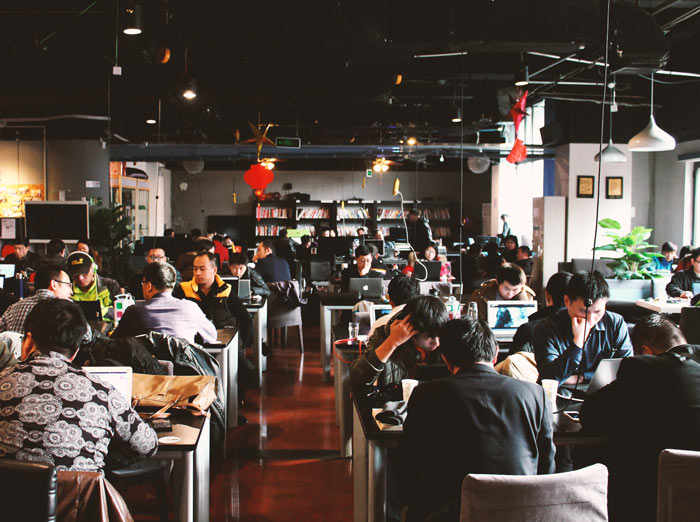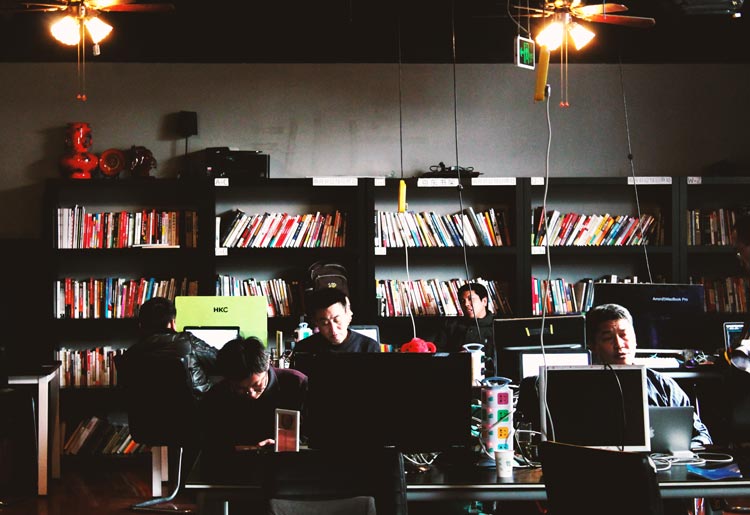Peking University went on holiday last month in observance of Chinese New Year. As such, I knew I would be logging quite a few extra programming hours over the course of February. While I don’t mind working part-time from the comfort of my apartment’s bedroom, I actually kind of hate working from home full time. There are benefits of course: fewer interruptions, more comfortable and configurable workspace and no commute. Nevertheless, I start to go a little crazy when I spend over 16 hours a day in the same 10′ x 10′ space.

I started looking for coworking spaces in Beijing right away. Despite whatever misconceptions most Westerners might have about China’s backwardness, Beijing actually has a thriving tech sector who’s physical heart lies just south of Peking University campus in a neighborhood called Zhong Guan Cun (中关村). Quite a few tech giants call Zhong Guan Cun home, including SINA Corp, Microsoft China, Tencent, Youku, Tudou and Qunar.
What really makes Zhong Guan Cun interesting, however, is it’s thriving start-up scene. There are actually hundreds of start-ups that call Beijing home. The concentrated nature of both established and start-up tech companies has recently earned Zhong Guan Cun the title “China’s Silicon Valley”. The industry boom has lead to a massive influx of coworking spaces and incubators designed to produce the next Weibo or WeChat. Most of these spaces follow the traditional business model, requiring either invitation or a hefty monthly fee or both. Recently, however, a new class of coworking spaces has arrived in Zhong Guan Cun. These places may call themselves “cafes”, but they offer much more than just coffee.
Meet Beijing's Garage Cafe
Garage Cafe (车库咖啡馆)can be difficult to find as a non-local. Its nestled in an alley called “Innoway” near the northwest corner of Zhong Guan Cun. According to one of the area’s natives, this alleyway used to be one of the largest book-seller streets in all of Beijing. Its only appropriate, therefore, that as the knowledge economy transitioned from paper to digital media, this information hub made the transition from literati bazaar to start-up haven.

The cafe itself sits on the second floor of an otherwise innocuous looking building. I walked around in circles and had to ask a few people on the street before I finally figured it out. Upon entering the building, it can almost feel like you’ve walked into a private apartment building rather than into one of the most important spots in the Chinese start-up scene:

Nevertheless, once you head up the back stairs and through the door, you’re greeted by a massive space humming with energy and excitement.

The floor space of the cafe measures to 800 square meters, and has seating for about 150 people. The decor is sleek and industrial; minimalist black furniture, exposed fixtures and extension cords hanging down from the ceiling. Unlike most cafes, which seem to despise laptop users, Garage Cafe’s message is clear: grab a seat, plug in and get coding. Every table has a charging station with enough plugs for laptops, cell phones and even external monitors. The internet is also quite fast, which is a rarity at Chinese cafes. They even go so far as to provide monitors for people to plug into while they work.

Garage Cafe boasts a pretty solid library of programming books in both English and Chinese. No matter where you sit in the cafe, you can catch wisps of conversation about product optimization, unit testing, market share, etc. As a foreigner who speaks Chinese, I already had several job offers after just my first visit to the cafe. People go to Garage to network, brainstorm and build. There’s also a huge bulletin board of job listings that can be great to check out if you’re looking for a position in a Beijing start-up.

Keep in mind that Garage Cafe is much more “Chinese” than most cafes in Beijing. The staff most definitely does not speak English, and in the 20 or so times I have visited so far, I have only ever seen one other non-Han patron. Nevertheless, if you can speak Chinese and are looking for an awesome space to get some work done or network with like-minded programmers, Garage Cafe is a great option. The coffee isn’t half bad either, at least by Chinese standards.

In case you want to check it out for yourself, here is the address of Garage Cafe in English and Chinese:
Haidian District,
Zhongguancun, Haidian Qiao,
Dong Nan Haidian Tu Shu Cheng Bu Xing Jie
北京市海淀区中关村海淀桥东南海淀图书城步行街 (鑫鼎宾馆2层) – 车库咖啡
You can also find the cafe on Weibo here.




